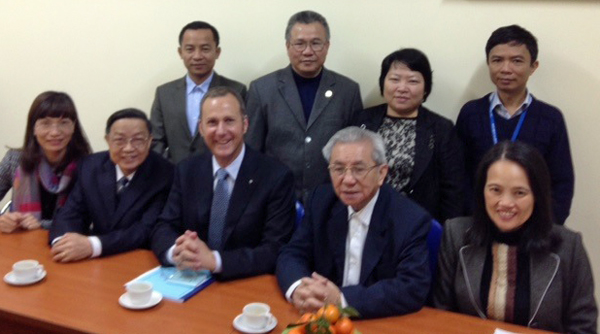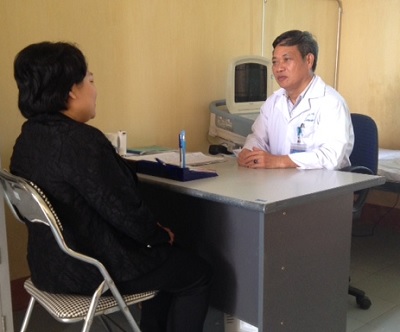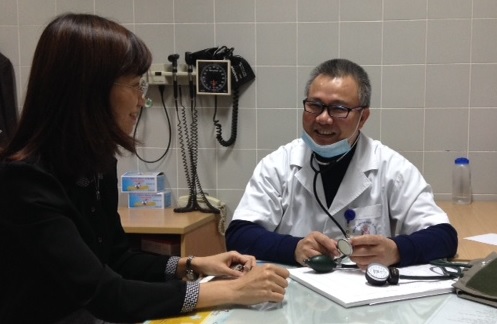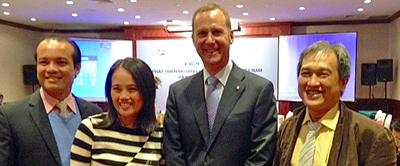From the President: Family Medicine Reform in Vietnam
 Photo: WONCA President with leadership of the Vietnam Association of Family Physicians including president, Professor Le Ngoc Trong, and founding member, Professor Pham Huy Dung.
español français
Photo: WONCA President with leadership of the Vietnam Association of Family Physicians including president, Professor Le Ngoc Trong, and founding member, Professor Pham Huy Dung.
español français
Dr Tran Trong Thong is a family doctor in the rural region of Soc Sun in Vietnam, north of the capital city of Hanoi. The Soc Sun Commune Health Station, where Dr Tran works, provides both curative and preventive care services to a dispersed rural community of 20,000 people. Dr Tran leads a primary health care team, which includes nurses, midwives, assistant doctors and a pharmacist, as well as a network of village (community) health workers, and also trains family medicine residents from the Hanoi Medical University. The Soc Sun Commune Health Station is one of a network of 10,000 Commune H

ealth Stations serving the primary care needs of the
people of Vietnam. Every village in Vietnam has at least one village
health worker, working under the guidance of their local Commune Health
Station.
Photo: Dr Tran Trong Thong, family doctor working in the rural Soc Sun Commune Health Station in Vietnam
I had travelled to Hanoi, the capital city of the Socialist Republic of Vietnam, at the invitation of the Ministry of Health, and the Health Strategy and Policy Institute, to review the work underway to develop the Family Doctor Model across the nation to strengthen primary health care and ensure universal health coverage. Family medicine development is a top priority for the Government of Vietnam and I was asked to advise especially on the lessons that Vietnam could take from experience in family medicine development in other countries with a focus on the education and training of the family medicine workforce, including training of new graduates and upskilling of existing doctors working in Commune Health Stations, and on the financial mechanisms needed to ensure high quality, sustainable health care services which will be trusted and utilised by the population, and which integrate prevention into curative care services.
It was wonderful to be taken by my hosts into the countryside, driving past communal farms, where I was told each plot is owned by a single family who grow what they wish and so each field contains a profusion of different crops. There were lots of people in big straw Asian conical hats working in the fields. And the occasional water buffalo wandering around wherever it liked.
With over 90 million inhabitants, 74% living in rural areas, Vietnam is the 13th most populous country in the world. It is a long thin country on the east of the Indochina Peninsula and I was surprised to learn that it has a similar total landmass to Germany.
The Vietnam Ministry of Health is developing a plan to further develop family medicine over the next five years, which includes training thousands more specialist family doctors to meet the nation’s health care needs and reforming the financing of primary health care.

Vietnam has a number of different models of family medicine including both private and public services. In Hanoi I visited Dr Nguyen Van Khuong and his colleagues at the Family Medicine Clinic of the Hanoi Medical University Hospital. The clinic is integrated into a very large and very busy teaching hospital, providing training for medical students and family medicine residents.
Photo: Dr. Nguyen Van Khuong at the Family Medicine Clinic of Hanoi Medical University Hospital
WONCA’s member organization in Vietnam is the Vietnam Association of Family Physicians, which this year celebrates its 10th anniversary. I met with the president, former Vice Minister for Health, Professor Le Ngoc Trong, and founding member, Professor Pham Huy Dung, who was one of the contributors to WONCA’s original guidebook on
The contribution of family medicine to improving health systems.

Family medicine has been a recognized medical specialty in Vietnam since 1998 and I was told there are now 800 postgraduate specialists in family medicine working in clinics across the country.
Photo: WONCA President with leaders from Vietnam’s family medicine
academic departments, Nguyen Minh Tam from Hue University of Medicine
& Pharmacy, Nguyen Phuong Hoa from Hanoi Medical University, and
Pham Le An from Ho Chi Minh City University of Medicine & Pharmacy
I was very impressed with all that I saw, especially the passion and commitment of the family medicine leaders in the clinics, in the medical schools and in the government, and the fruitful and longstanding partnerships with family medicine colleagues from the USA and Belgium and other parts of the world.
This is an exciting time as many countries, like Vietnam, look to family medicine for the solutions to their major health care challenges. WONCA can contribute to family medicine development in many ways, through our publications and resources, through our standards, and especially through our member organisations and the many thousands of family doctors around the world who are willing to volunteer their time to support our colleagues in other nations in their work to deliver high quality primary care to all people.
Michael Kidd
WONCA President